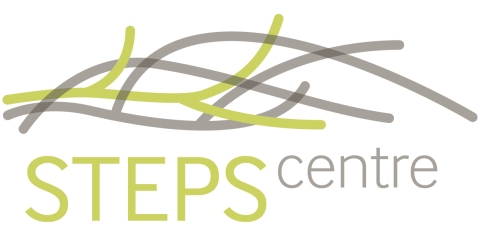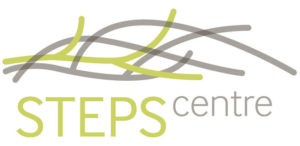The ESRC STEPS (Social, Technological and Environmental Pathways to Sustainability) Centre carried out interdisciplinary global research uniting development studies with science and technology studies.

The Centre’s mission was to highlight, reveal and contribute to just and democratic pathways to sustainability that include the needs, knowledge and perspectives of poor and marginalised people. The STEPS Pathways Approach linked theory, research methods and practice to highlight and open up the politics of sustainability.
The STEPS Centre’s work highlighted different responses to complex challenges like climate change, food systems, urbanisation and technology in which society and ecologies are entangled. STEPS research explored how poor and marginalised people can be involved in identifying and diagnosing problems, as well as deciding what to do. This often involves challenging power and assumptions, and exploring many different values, perspectives and possible futures through diverse methodologies.
The STEPS Centre was hosted in the UK by the Institute of Development Studies and the Science Policy Research Unit (SPRU) at the University of Sussex. Its main funding was from the UK’s Economic and Social Research Council (ESRC).
STEPS worked as part of a Global Consortium with hubs in Africa, China, Europe, Latin America, North America and South Asia. Our research projects, in many countries, engaged with local problems and linked them to wider concerns.
The STEPS Centre’s Co-Directors were Prof Ian Scoones (IDS) and Prof Andy Stirling (SPRU). It is a partner in the Green Economy Coalition and Future Earth.
Current focus
From 2018-2021 the STEPS Centre and Global Consortium focused on four annual themes.
2018: Transformations
Faced with a series of social and environmental stresses and shocks, there are urgent calls for radical, systemic change. But, as past and present experience show, this can take many forms. What does it take to make sustainability transformations emancipatory (caring), rather than repressive (controlling)?
2019: Uncertainty
Uncertainties can make it hard to plan ahead. But recognising them can help to reveal new questions and choices. What kinds of uncertainty are there, why do they matter for sustainability, and what ideas, approaches and methods can help us to respond to them?
2020: Natures
Nature is all around us, but there are many ways of seeing different kinds of ‘natures’, and many efforts to involve it in forms of control or domination. How is talk of crisis shaping nature and people’s views of it? How can colonial forms of knowledge, technology and power be challenged, and what might it mean to ‘decolonize’ the study of environmental change? What do alternatives look like, and how can we explore, nurture, imagine and live the relationships we might want for the future?
2021: Methods
Many methods offer ways to link knowledge and action for sustainability. But there are intense pressures to close down and narrow the way knowledge is produced and used for instrumental ends. What methodological assemblages, frameworks, tools and associated ways of being could help challenge these pressures, open up to more perspectives and participation in research, and allow us to pursue more plural pathways to sustainability?
Find out more
- Website: www.steps-centre.org
- Our people
- Our research
- Our publications
- Follow us on Twitter: @stepscentre
- Blog: Read our blog
- Video: STEPS Centre YouTube Channel
Media enquiries
Nathan Oxley, Communications & Impact Manager, STEPS Centre E: [email protected] T: +44 (0)1273 915826 M: +44 (0)7702 884039

